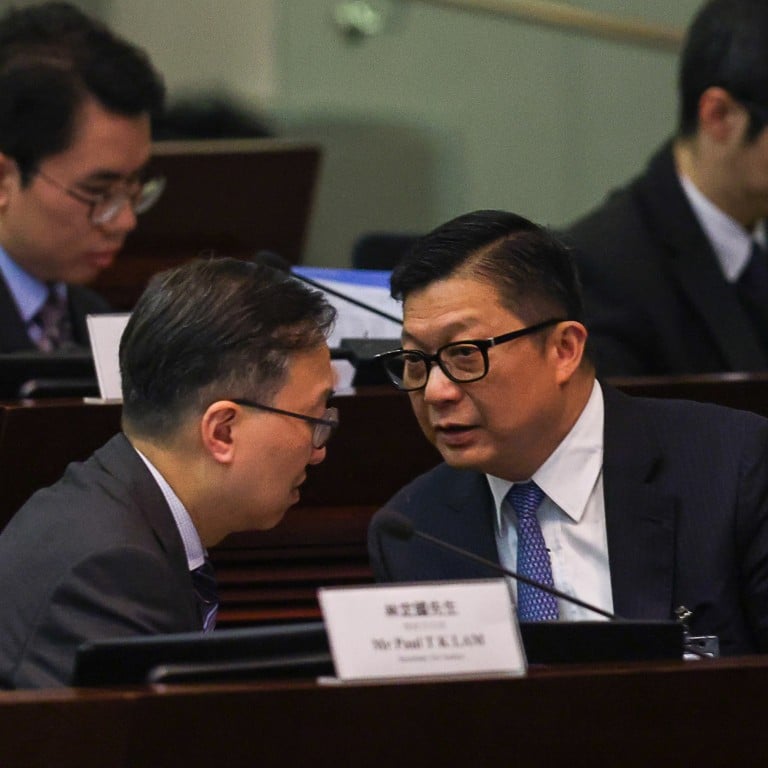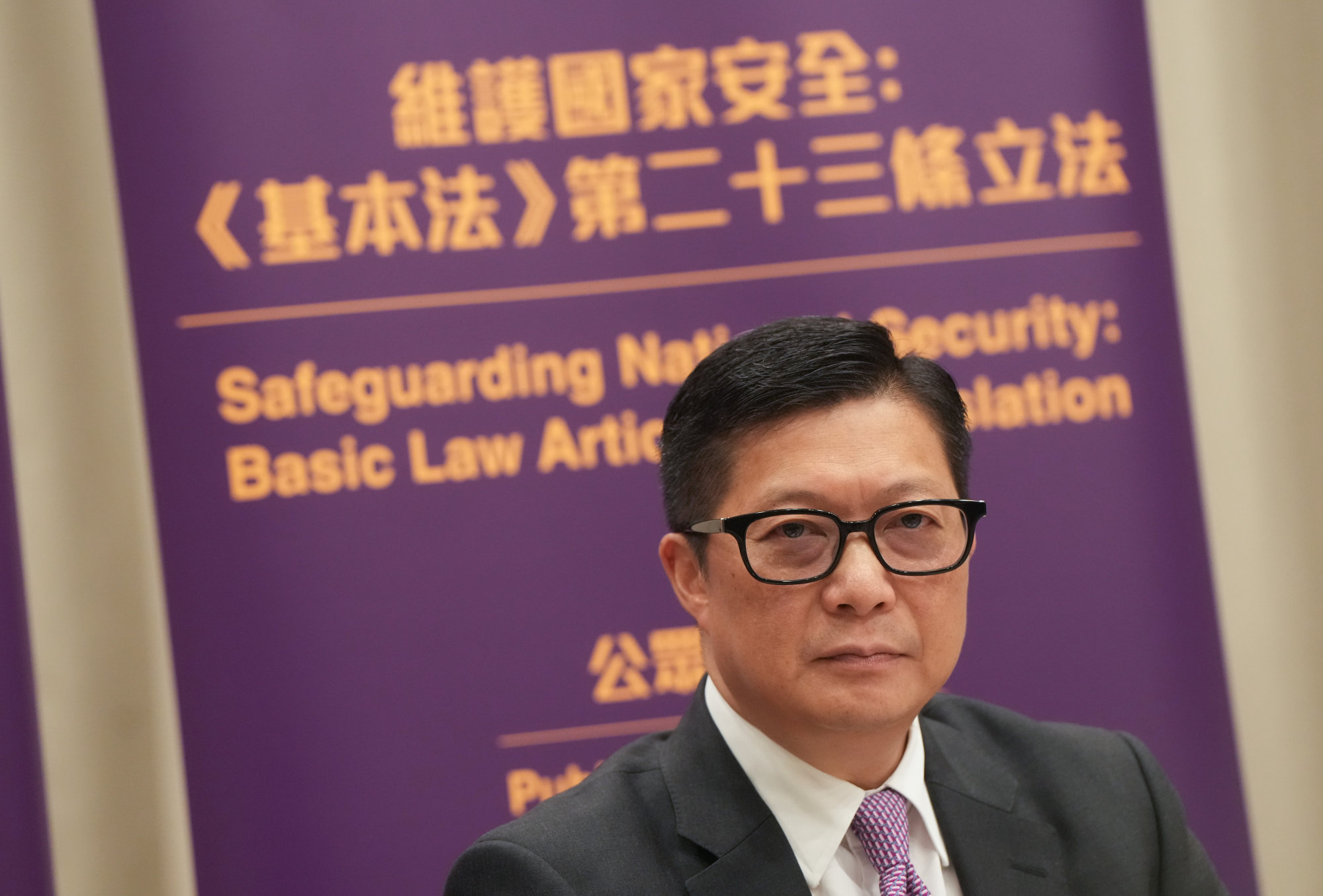
‘Relax and take a deep breath’: Beijing slams Washington Post over ‘alarmist’ Hong Kong Article 23 law editorial
- Hong Kong security chief also hits out at three outlets, including Bloomberg News over ‘misleading and scaremongering’ op-ed about Article 23 law
- Piece in UK’s Times claims people will be jailed for keeping copies of now-defunct Apple Daily tabloid, while Washington Post editorial says ‘repression’ will expand
A spokesman for the foreign ministry’s arm in Hong Kong said in an open letter to The Washington Post’s editorial board on Tuesday that it was “deeply shocked” by the paper’s “ignorance and double standard” on the city after reading a piece titled, “With the new security law, Hong Kong doubles down on repression”.
The editorial published on Sunday said the end of a one-month public consultation period last month for the domestic national security law was “another sad milestone in Hong Kong’s downward trajectory”.
“Regarding your alarmist assertion that ‘China has crushed what had been one of its greatest assets,’ well, just relax and take a deep breath,” a spokesman for the Commissioner’s Office of the Foreign Ministry in Hong Kong said in the English version of the letter.
It dismissed the paper’s forecast on Hong Kong’s future in relation to the current legislation of the home-grown national security law required under Article 23 of the Basic Law, the city’s mini-constitution.
“You are right in referring to February 28 this year, the end of the Article 23 legislation consultation period, as a ‘milestone’, but it is a milestone marking Hong Kong’s upwards trajectory from chaos to stability and prosperity, rather than ‘downward trajectory’ in your gloomy forecast,” the letter said.
The spokesman also responded to the paper’s criticism of a court case involving 47 opposition figures accused of a conspiracy to commit subversion over an alleged plot to topple the city’s government.
“I totally understand your despair [about] ‘letting all 47 go free’, but I suggest you leave the judgment to the courts, because it is their job, right?” the letter said.
“To your dismay, the evidence exposed during the trial shows that those charged are not as ‘innocent’ as you thought.”
Hong Kong’s Secretary for Security Chris Tang Ping-keung also said in a letter to the editor of The Washington Post on Monday night that the government “strongly opposed and condemned” the “misleading and inappropriate remarks”.

He said the newspaper had “neglected” to mention the city’s constitutional duty to enact the legislation.
The city government also condemned an op-ed from Bloomberg News, as well as issuing a strongly worded statement in response to an article from The Times titled: “Hongkongers to be jailed for keeping old newspapers”.
“Not only is the report extremely misleading, its headline is also completely wrong, which misleads people into believing that one can be imprisoned for possessing certain old newspapers, thereby generating panic among members of the public,” a government spokesman said on Tuesday.
“It is incumbent upon The Times to ensure that reports concerning the Basic Law Article 23 legislation … are fair and just, and stop making scaremongering remarks.”
Lawmakers scrutinising the domestic national security bill have raised questions in recent days over the implications of keeping old copies of Apple Daily.
Without naming the now-defunct tabloid, Tang earlier told lawmakers that residents might need to have a “reasonable excuse” if they had saved old publications later deemed seditious.
In the article published on Monday, The Times claimed that the city’s authorities had said Hong Kong people could be “convicted and imprisoned” for up to three years for sedition if they kept copies of Apple Daily under the coming security law.
‘Lethal weapon’: prosecutors take aim at 47 in Hong Kong national security trial
The government spokesman said that under the proposed legislation, a person only violated the law when they possessed a publication that had a seditious intention “without reasonable excuse”.
“Whether a publication has a seditious intention will have to be determined after all relevant circumstances are taken into consideration, including the context and purpose of the publication,” he said, adding the bill had listed out circumstances that do not equate to having such intentions.
“It is not possible for a person who does not know that the publication concerned has a seditious intention to be convicted,” the spokesman said.
Tang also hit back at the op-ed run by Bloomberg News on Tuesday, slamming the piece, titled “Hong Kong’s New Security Law is Worryingly Vague”, by columnist Karishma Vaswani as “misleading and scaremongering”.
The op-ed writer described the clauses laid out in the Article 23 bill as sweeping and deliberately vague, especially those concerning “external force”.
She also wrote that Hong Kong’s leader could ban companies and other organisations from operating in the city if they were found to be “working for foreign forces”.
Tang wrote to the news outlet, arguing the piece’s remarks on external force were “plainly inaccurate”. He also said that organisations would not be banned from operating in the city solely because they were “found to be ‘working for foreign forces’”.
Hong Kong lawmakers discuss longer detention time for suspects in Article 23 bill
The security minister said the proposed offence sought to catch those individuals collaborating with external forces and using improper means, such as violence or threats, with an intent to interfere in local matters.
“It is not possible for normal proper business operations and external exchanges to have unwittingly violated the law,” he said.
Tang also defended some of the proposed changes to law enforcement powers, such as the extension of detention hours from 48 hours to up to 16 days, saying such a move had strict conditions and that many countries had similar provisions.
“Sheer hypocrisy and double standards are clearly seen in the piece,” he said.


